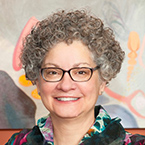
Scientific Areas of Expertise: Anti-Cancer Therapies; Genetic Models of Cancer; p53 Tumor Suppressor Pathway
For establishing that p53 contains a transactivation domain, in turn defining the protein as a transcription factor; for showing the potent effects of Mdm2 and Mdm4 in p53 inhibition; for dissecting p53-mediated cell cycle arrest and senescence activities as tumor suppressive mechanisms; for exploring its physiologic significance in potential anticancer therapies; and for showing gain-of-function properties of missense p53 mutants resulting in the functional inactivation of p63 and p73.
A world-renowned geneticist, Dr. Lozano is celebrated for her meticulous dissection of the p53 tumor suppression cascade whereby she employed innovative molecular genetic approaches to reveal the physiological relevance of p53 in tumorigenesis and to identify potential targets for therapeutic interventions. Notably, Dr. Lozano was the first to define p53 as a transcriptional activator and illuminated the failure of p53 mutants to initiate transcription. Through her analysis of p53 mutants with gain-of-function missense mutations, Dr. Lozano elegantly demonstrated associated downstream effects on the functional inactivation of p63 and p73. She has since created numerous mouse models of p53 mutations to facilitate the study of tumor development in vivo and using these novel cancer models, showed that p53 missense mutations result in more aggressive cancers. Other models expanded the tumor suppressor activities of p53 by showing that cell cycle arrest and maintenance of chromosomal stability are as important as apoptosis in tumor suppression.
Dr. Lozano’s work also significantly contributed to the understanding of the upstream components of the p53 pathway and the signals that modulate p53 function. Paramount in these findings was the identification of the potent inhibitory roles of Mdm2 and Mdm4 on p53 activity in development and cancer. Importantly, Dr. Lozano has uncovered effects on cancer risk associated with harboring a single nucleotide polymorphism in the Mdm2 gene, the importance of the Mdm2 feedback loop in the DNA damage response, and the impact of elevated Mdm4 levels on tumorigenesis. Further, use of a conditional loss-of-function Mdm2 allele showed that p53 drives expression of a large repertoire of genes integrated to induce both cell autonomous and non-cell autonomous responses and transcriptional plasticity. She discovered that restoration of p53 causes tumor regression in the absence of p53 but causes tumor stasis in the context of increased Mdm2 or p53 missense mutations. These seminal discoveries have and continue to contribute to the generation of novel targeted therapeutic approaches by which to pharmacologically disrupt the p53-Mdm2/Mdm4 axis.
Selected Awards and Honors
2020 Benvenuto Memorial Lecture and Award, University of Texas MD Anderson Cancer Center, Houston, Texas
2020 Elected Member, American Academy of Arts and Sciences, Cambridge, Massachusetts
2019 Jack and Beverly Randall Prize for Excellence in Cancer Research, University of Texas MD Anderson Cancer Center, Houston, Texas
2018 President’s Leadership Award for Advancing Women and Minority Faculty, University of Texas MD Anderson Cancer Center, Houston, Texas
2018 E.E. Just Award, American Society for Cell Biology, Bethesda, Maryland
2017 Elected Member, National Academy of Sciences, Washington, DC
2017 Hall of Fame, Greater Houston Women’s Chamber of Commerce, Houston, Texas
2014 Barbara Bowman Distinguished Texas Geneticist Award, Texas Genetics Society, Denton, Texas
2014 Elected Member, National Academy of Medicine, Washington, DC
2014 Elected Member, Academy of Medicine, Engineering and Science of Texas, Austin, Texas
2013 AACR-Women in Cancer Research Charlotte Friend Lectureship, American Association for Cancer Research, Philadelphia, Pennsylvania
2012 Distinguished Alumnus Award, University of Medicine and Dentistry of New Jersey Graduate School of Biomedical Sciences, Newark, New Jersey
2011 Elected Fellow, American Association for the Advancement of Science, Cambridge, Massachusetts
2011 AACR- Minorities in Cancer Research Jane Cooke Wright Lectureship, American Association for Cancer Research, Philadelphia, Pennsylvania